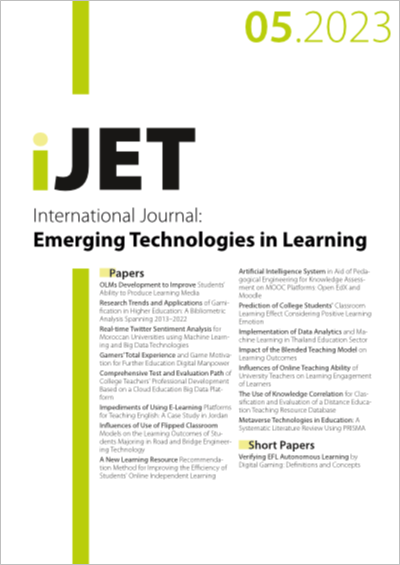Research Trends and Applications of Gamification in Higher Education: A Bibliometric Analysis Spanning 2013–2022
DOI:
https://doi.org/10.3991/ijet.v18i05.37021Keywords:
research trends, bibliometric analysis, gamification, higher educationAbstract
Gamification plays an essential role in supporting educational goals. Existing literature confirmed that gamification has been widely used to elevate student achievement in many fields. This study examines the current status and research trends of gamification applications in higher education by conducting a comprehensive bibliometric analysis during the period 2013-2022. This study focuses on publication language, growth rates, most frequent author keywords, most cited papers, most prolific authors, most impactful journals, most productive institutions, and most active countries. For bibliometric mapping analysis, a total of 819 peer-reviewed journal articles were retrieved from the Scopus database. The results showed that: (1) the majority of the manuscripts are written in English, (2) the peak of publication is 2021 with 216 papers, (3) gamification, higher education, and motivation have been the most used keywords, (4) the works of Domínguez et al., de-Marcos et al., and Buckley and Doyle have been the most frequently cited documents, (5) de-Marcos, Boyle, and Pérez-López have been the most important authors, (6) Sustainability, International Journal of Emerging Technologies in Learning, and Journal of Chemical Education have been among the top journals, (7) Universidad de Granada, Universidad de Sevilla, and Tecnologico de Monterrey have been the top institutions, and (8) Spain, the US, and the UK have been the most important countries in this area. This study offers a useful contribution in the area and provides a comprehensive overview, scientific landscape, and future direction of the field.
Downloads
Published
How to Cite
Issue
Section
License
Copyright (c) 2023 Irwanto Irwanto, Dwi Wahyudiati, Anip Dwi Saputro, Sigit Dwi Laksana

This work is licensed under a Creative Commons Attribution 4.0 International License.


